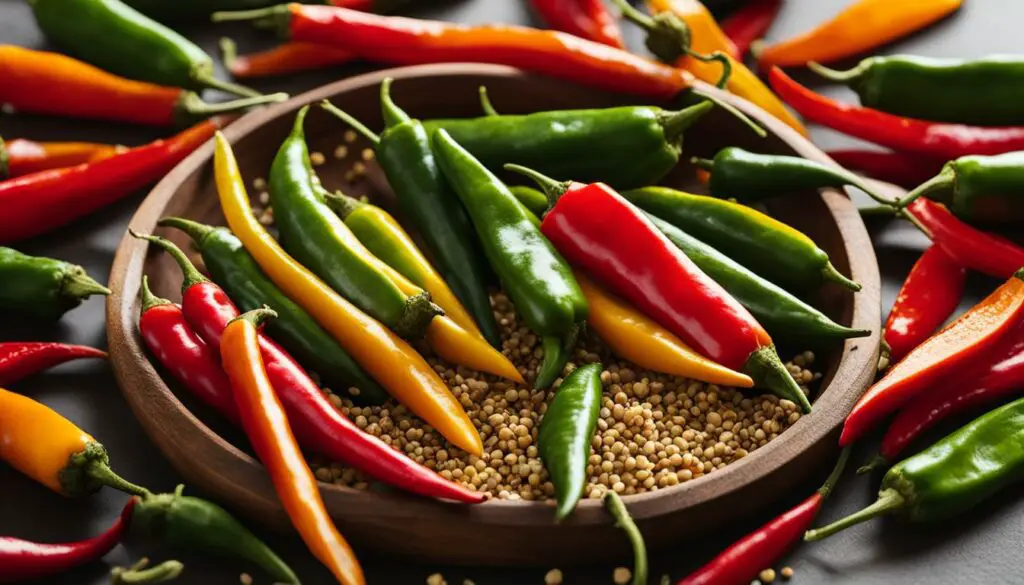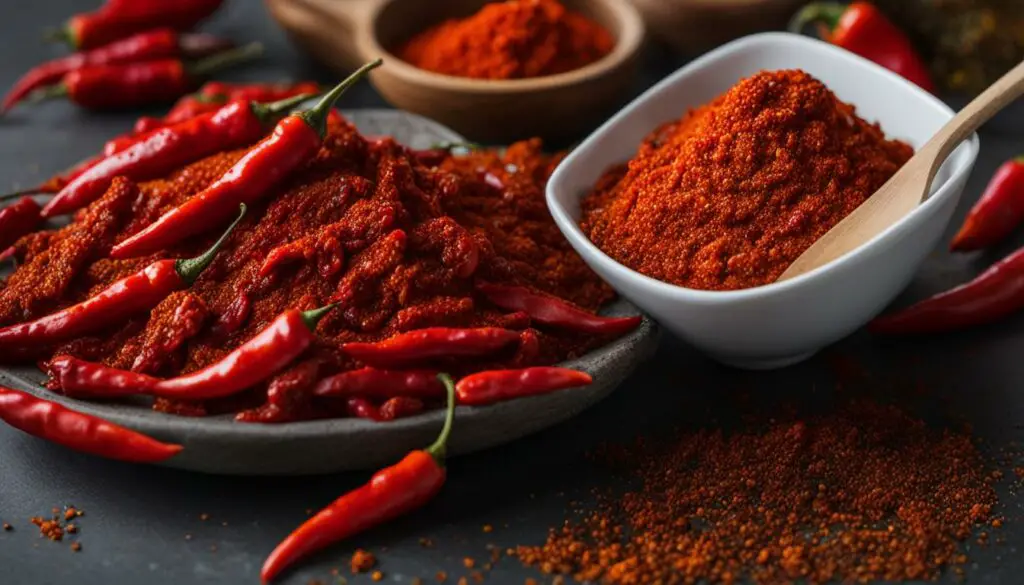Originally posted on November 17, 2023 @ 6:50 am
Shichimi is a traditional Japanese spice blend known for its potent and spicy flavor. However, if you’re out of shichimi or looking to try something new, there are plenty of substitutes available to add unique flavors to your dishes. From red pepper flakes to Chinese five spice, these alternatives can provide a similar level of heat or bring a different flavor profile entirely.
In this section, we will introduce you to a variety of substitutes for shichimi that can elevate your cooking game. Whether you’re looking for alternative spices for shichimi or shichimi pepper substitutes, these options will add a twist to your recipes and excite your taste buds.
Table of Contents
Key Takeaways
- Shichimi is a traditional Japanese spice blend with a spicy flavor profile.
- There are plenty of substitutes available to add unique flavors to your dishes.
- From red pepper flakes to Chinese five spice, these alternatives can provide similar heat or bring a different flavor profile entirely.
- Whether you’re looking for alternate spices for shichimi or shichimi pepper substitutes, there are plenty of options to choose from.
- By experimenting with these substitutes, you can expand your culinary horizons and spice up your meals.
Understanding Shichimi: A Brief Introduction to this Japanese Spice Blend

Shichimi, also known as shichimi togarashi, is a popular Japanese spice blend made from seven different ingredients. The name “shichimi” translates to “seven flavors” in Japanese, referring to its unique blend of spices.
The ingredients of shichimi vary, but they typically include red chili pepper, Sichuan pepper, dried orange peel, sesame seeds, ginger, nori, and poppy seeds. These seven ingredients are carefully balanced to create a flavor profile that is both spicy and aromatic.
Shichimi is commonly used in Japanese cuisine as a seasoning for soups, noodles, grilled meats, and vegetables. It is also used as a table condiment, served in small shakers, allowing diners to add extra heat and flavor to their meals.
If you’re unable to find shichimi or would like to experiment with different flavors, there are a variety of substitutes available. In the following sections, we will introduce you to some shichimi blend alternatives, shichimi togarashi replacements, and shichimi seasoning substitutes to help spice up your meals.
“Shichimi is commonly used in Japanese cuisine as a seasoning for soups, noodles, grilled meats, and vegetables.”
Red Pepper Flakes: A Simple and Spicy Alternative

If you’re out of shichimi or looking for shichimi spice alternatives, red pepper flakes can be an excellent substitute with a similar level of spiciness. These dried and crushed peppers are a common addition to many dishes, particularly Italian and Mediterranean cuisines.
To use red pepper flakes, sprinkle them into your dish and adjust the amount based on your desired level of heat. Keep in mind that they can be quite spicy, so start with a small amount and gradually add more if needed. Red pepper flakes are readily available in most grocery stores and can be a great addition to your spice rack.
Gochugaru: A Korean Twist for Your Taste Buds

Gochugaru, also known as Korean chili powder, is a marvelous substitute for shichimi, bringing a unique twist to your meals. This spice typically consists of dried and ground red chili peppers, providing a smoky and slightly sweet flavor that is less complex than shichimi but equally delicious.
Used in Korean cuisine to flavor stews, soups, and marinades, gochugaru can also replace shichimi as a seasoning for grilled meats, vegetables, and rice dishes. It offers a moderate level of heat that can be adjusted according to your preference, making it suitable for a wide variety of palates.
| Shichimi | Gochugaru |
|---|---|
| Complex blend of flavors | Smoky and slightly sweet |
| Signature spicy kick | Moderate level of heat |
| Consists of seven ingredients | Made from dried and ground red chili peppers |
As a shichimi substitute ingredient, gochugaru works particularly well when combined with other Asian seasonings like soy sauce, sesame oil, and rice vinegar. You can also use it as a dry rub for meat or add it to your homemade dipping sauces for a Korean-inspired twist.
Chinese Five Spice: A Complex Flavor Profile

If you’re looking for a substitute that brings a unique blend of flavors, Chinese five spice is an excellent option. This traditional Chinese spice blend consists of star anise, cloves, Chinese cinnamon, Szechuan peppercorns, and fennel seeds. Use it in place of shichimi for a delightful mix of sweet, savory, and slightly spicy notes.
The star anise provides a licorice-like sweetness, while the cloves offer a warm, slightly bitter taste. The Chinese cinnamon adds a sweet and spicy flavor, and the Szechuan peppercorns bring a distinct numbing sensation to the tongue. Lastly, the fennel seeds provide a mild anise flavor and a subtle crunch.
Chinese five spice can be used in a variety of dishes, from stir-fries to marinades and rubs. It pairs well with meats like pork, duck, and chicken, as well as vegetables like eggplant and bell peppers.
Fun Fact: Some variations of Chinese five spice may include ginger, nutmeg, or licorice root.
Next time you’re out of shichimi or looking for a shichimi flavor alternative, consider giving Chinese five spice a try. Its complex flavor profile will add a new dimension to your cooking.
Za’atar: A Middle Eastern Herb and Spice Blend

Za’atar is a popular Middle Eastern herb and spice blend that can add a burst of savory flavor to your dishes. The blend typically includes ingredients like thyme, sumac, sesame seeds, and salt. It is generally sold as a dry spice mix or a paste, making it a versatile ingredient in many recipes.
If you are looking for alternative spices for shichimi, za’atar is an excellent option to consider. It has a similar flavor profile to shichimi, with notes of earthy herbs and a subtle, nutty undertone. Additionally, many of the ingredients found in za’atar have been shown to have potential health benefits. For example, sumac is known to be high in antioxidants, while sesame seeds are an excellent source of healthy fats.
How to Use Za’atar as a Substitute for Shichimi
Za’atar can be used in many of the same ways as shichimi. Here are a few ways to incorporate it into your cooking:
- Sprinkle it on roasted vegetables or meats for added flavor.
- Mix it into tahini or yogurt-based dips for a Middle Eastern twist.
- Use it as a rub for grilled or roasted chicken.
- Sprinkle it over hummus or other dips for added texture and flavor.
Overall, za’atar is a versatile and delicious spice blend that can be an excellent substitute for shichimi. Whether you’re looking for alternative spices for shichimi or simply want to experiment with new flavors, za’atar is a great option to consider. Try it out in your favorite recipes and see how it can transform your dishes!
Cajun Seasoning: A Fiery and Flavorful Swap

If you’re a fan of bold and spicy flavors, Cajun seasoning is an excellent substitute for shichimi. Originating from Louisiana, this popular spice blend packs a punch with its combination of paprika, cayenne pepper, garlic powder, onion powder, and other ingredients.
Cajun seasoning is a great option for those looking for shichimi spice alternatives or shichimi-like seasonings. It can be used in a variety of dishes, including meat, seafood, and vegetables, for a fiery and flavorful kick.
How to Use Cajun Seasoning
To use Cajun seasoning as a substitute for shichimi, simply sprinkle it over your dish or use it as a rub before cooking. It pairs well with chicken, fish, shrimp, and other seafood, as well as vegetables like potatoes and corn.
For a classic Cajun-inspired dish, try using Cajun seasoning to make blackened chicken or shrimp. Coat your protein in the seasoning and cook in a cast-iron skillet over high heat until blackened and cooked through.
Benefits of Cajun Seasoning
Cajun seasoning not only adds bold and spicy flavors to your dishes but also comes with some health benefits. The paprika in Cajun seasoning contains capsaicin, which has been shown to have anti-inflammatory properties and can help reduce pain. Garlic powder and onion powder are also known for their immune-boosting properties.
Overall, Cajun seasoning is a great shichimi substitute for those looking for a bold and spicy flavor profile in their meals.
Harissa Paste: A Tangy and Spicy Alternative

If you’re a fan of both heat and tang, one of the best substitutes for shichimi is harissa paste. This North African spice paste packs a punch with its combination of chili peppers, garlic, cumin, coriander, and other spices.
Harissa paste is known for its intense and vibrant flavors that can transform any dish. It’s suitable for meat, vegetables, and stews, making it a versatile ingredient to have in your pantry. Swap shichimi with harissa paste, and you’ll get a unique twist on traditional Japanese dishes.
| Shichimi Pepper | Harissa Paste |
|---|---|
| Traditionally Japanese | North African |
| Mild heat with a mix of spices | Intense heat with a citrusy, garlicky taste |
| Suitable for rice dishes and soups | Great for meats, vegetables, and stews |
As you can see from the table above, harissa paste is a great substitute for shichimi pepper if you’re looking for a tangy, bold taste. Use it to add some kick to your recipes, and you won’t be disappointed!
Curry Powder: Aromatic and Versatile
If you’re searching for shichimi seasoning substitutes, curry powder is a great option. This versatile spice blend is a staple in Indian cuisine, known for its warm and fragrant aroma. Curry powder typically includes a combination of spices such as coriander, cumin, turmeric, fenugreek, and other flavors.
Compared to shichimi, curry powder offers a milder heat level but provides a complex mix of flavors, making it an excellent substitute for dishes that require a subtle spice profile. Its aromatic and versatile nature allows it to complement a variety of cuisines, from Indian to Thai to Middle Eastern.
To use curry powder as a shichimi blend alternative, simply replace it in your recipe according to your taste preferences. Whether you’re making a vegetable stir-fry, a salmon curry, or a chicken tikka masala, curry powder can add a new dimension of flavor to your dishes.
Try experimenting with different brands and types of curry powder to find the one that suits your taste buds best. Some popular varieties include Madras curry powder, Japanese curry powder, and Thai green curry powder.
Conclusion
Now that you have learned about some popular substitutes for shichimi, you can spice up your meals with new and exciting flavors. Whether you prefer a similar level of heat or want to experiment with unique taste profiles, there are plenty of substitutes out there to choose from.
Remember, if you’re looking for a fiery kick, red pepper flakes or gochugaru can provide a similar level of spiciness to shichimi. If you want to try something completely different, consider using Chinese five spice, za’atar, or harissa paste. These ingredients offer an array of complex flavors that can complement a variety of different cuisines.
Final Thoughts
Don’t be afraid to experiment with different spices and seasonings in your cooking. There are countless possibilities out there when it comes to flavor, and trying out new things can be a fun and rewarding experience.
With this guide to substitutes for shichimi, you can continue to enjoy the vibrant flavors of Japanese cuisine while discovering new tastes along the way. So go ahead and get creative in the kitchen – your taste buds will thank you!
FAQ
What is shichimi?
Shichimi, also known as shichimi togarashi, is a traditional Japanese spice blend made from seven different ingredients. It is known for its vibrant flavor and spicy kick.
Why would I need substitutes for shichimi?
There are several reasons why you might need substitutes for shichimi. You may be unable to find it in your local grocery store or prefer a milder taste. Additionally, trying out different spice blends can add unique flavors to your recipes.
What can I use if I run out of shichimi?
If you run out of shichimi, there are several alternatives you can try. Some popular options include red pepper flakes, gochugaru, Chinese five spice, za’atar, Cajun seasoning, harissa paste, and curry powder.
How can I use red pepper flakes as a substitute for shichimi?
Red pepper flakes can be used as a substitute for shichimi to add a spicy kick to your dishes. Simply sprinkle them into your recipes according to your desired level of heat.
What is gochugaru and how can I use it as a substitute for shichimi?
Gochugaru is a Korean chili powder that can be used as a substitute for shichimi. It offers a smoky flavor with a moderate level of heat. Use gochugaru in place of shichimi to infuse your dishes with a unique Asian twist.
Can I use Chinese five spice as a substitute for shichimi?
Yes, Chinese five spice can be a great substitute for shichimi. This spice blend consists of star anise, cloves, Chinese cinnamon, Szechuan peppercorns, and fennel seeds, providing a mix of sweet, savory, and slightly spicy flavors.
What is za’atar and how can I use it as a substitute for shichimi?
Za’atar is a Middle Eastern herb and spice blend that can be used as a substitute for shichimi. It typically includes ingredients like thyme, sumac, sesame seeds, and salt. Swap shichimi with za’atar to add a burst of savory flavor to your dishes.
Can Cajun seasoning be used as a substitute for shichimi?
Absolutely! Cajun seasoning is a bold and spicy spice blend originating from Louisiana. With ingredients like paprika, cayenne pepper, garlic powder, and onion powder, it can provide a robust and smoky taste similar to shichimi.
How can harissa paste be used as a substitute for shichimi?
Harissa paste is a North African spice paste that combines chili peppers, garlic, cumin, coriander, and other spices. It can be used as a substitute for shichimi if you’re looking for a tangy and spicy flavor profile.
Is curry powder a suitable substitute for shichimi?
Yes, curry powder can be a versatile substitute for shichimi. It offers a blend of warm and aromatic spices, including coriander, cumin, turmeric, fenugreek, and more. Use curry powder to add a mild heat and fragrant aroma to your dishes.
How do these substitutes enhance my meals?
These substitutes for shichimi allow you to experiment with different flavors and spice up your meals. Whether you’re looking for a similar heat level, unique flavor profiles, or regional twists, these alternatives are sure to satisfy your taste buds and bring new possibilities to your cooking.
See also:
Leave a Reply